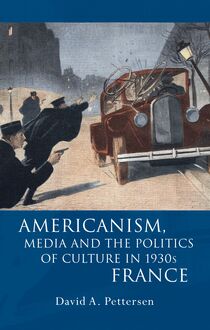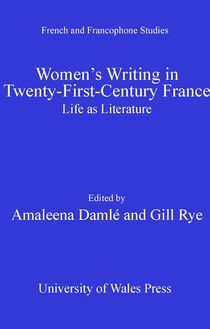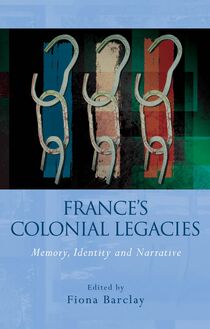‘Taking Up Space’ , livre ebook
179
pages
English
Ebooks
2022
Vous pourrez modifier la taille du texte de cet ouvrage
Obtenez un accès à la bibliothèque pour le consulter en ligne En savoir plus
Découvre YouScribe et accède à tout notre catalogue !
Découvre YouScribe et accède à tout notre catalogue !
179
pages
English
Ebooks
2022
Vous pourrez modifier la taille du texte de cet ouvrage
Obtenez un accès à la bibliothèque pour le consulter en ligne En savoir plus
Publié par
Date de parution
15 novembre 2022
Nombre de lectures
6
EAN13
9781786839091
Langue
English
Focusing on representations of women’s experiences in contemporary France, ‘Taking Up Space’ examines how women inhabit a variety of work spaces. It also speaks to the importance of cultural productions in calling out labour issues affecting women, as well as in offering a platform that allows us to imagine a future where inclusive and equitable work spaces are the norm. Drawing on Sara Ahmed’s phenomenological use of objects, the book explores women’s experiences through different metaphors of the door related to labour. The contributors demonstrate how doors are not only closed or open, but also serve as a threshold. Taken together, the chapters convey how women’s work experiences can range from states of oppression to survival and celebration, and demonstrates how through deliberate stances and actions, various work spaces can become sites of liberation and revolution.
Acknowledgments
Notes on Contributors
Introduction - Siham Bouamer and Sonja Stojanovic
PART I Behind Closed Doors: Work and Intimate Spaces
A Transmedial and Transtemporal Reading of Labour on the Run in Albertine - Sarrazin’s L’Astragale
Polly Galis
Good Housekeeping: Domestic Noir and Domestic Work in Leïla Slimani’s Chanson douce - Ciara GormanA Woman’s Huis clos: Exhausted Feminism in Paule Constant’s Confidence pour confidence - Jennifer Willging A Life’s Work: Accounting for Birth in Naissances - Amaleena Damlé
Sexual Identity as Work in Mireille Best’s Il n’y a pas d’hommes au paradis - Blase A. Provitola
Psychoanalytical Work in Chahdortt Djavann’s Je ne suis pas celle que je suis - Rebecca Rosenberg
PART II Revolving Doors: Liminal and Precarious Spaces
‘Be proud of all the Fatimas’: From Alienated Labour to Poetic Consciousness in Philippe Faucon’s Fatima - Siham Bouamer
Chimerical Cashiers: Exposure, Ableism and the Foreign Body in Marie-Hélène Lafon’s Gordana and Nos vies - Sonja Stojanovic
Subterranean Space and Subjugation: ‘Being Below’ in Delphine de Vigan’s Les Heures souterraines - Dorthea Fronsman-Cecil
In Concrete Terms: Gendering Labour in Anne Garréta’s Dans l’béton - Jennifer Carr
Woman at Sea? Space and Work in Catherine Poulain’s Le grand marin - Amy Wigelsworth
From Cabaret to the Classroom: Bambi’s Professional Transition - Maxime Foerster
PART III From Opening a Few Doors to Blowing Them Off
Women’s Bénévolat militant at the Beginning of the MLF - Sandra Daroczi
Women Working – Women Rebelling. Female Community and Gender Relations in Ah!Nana - Valentina Denzel ‘Putting Us Back in Our Place’: #MeToo, Women and the Literary/Cultural Establishment - Mercédès Baillargeon
Breaking Down Barriers and Advocating for Change in the French Film Industry: The Career and Activism of Actress Aïssa Maïga - Leslie Kealhofer-Kemp
Unapologetically Visible? Representing and Reassessing Contemporary French Womanhood in Dix Pour Cent - Loïc Bourdeau
Tracées to Black Excellence? Black Women at Work in Mariannes Noires by Mame-Fatou Niang and Kaytie Nielsen - Johanna Montlouis-Gabriel
Conclusion - Siham Bouamer and Sonja Stojanovic
Publié par
Date de parution
15 novembre 2022
EAN13
9781786839091
Langue
English
FRENCH AND FRANCOPHONE STUDIES
‘Taking Up Space’
Series Editors
Hanna Diamond (Cardiff University)
Claire Gorrara (Cardiff University)
Editorial Board
Kate Averis (Universidad de Antioquia)
Natalie Edwards (University of Adelaide)
Kate Griffiths (Cardiff University)
Simon Kemp (University of Oxford)
Margaret Majumdar (University of Portsmouth)
Debarati Sanyal (University of California, Berkeley)
Maxim Silverman (University of Leeds)
Other titles in the series
Margaret E. Gray, Stolen Limelight: Gender and Displacement in Modern Fiction in French (2022)
Audrey Evrard, Precarious Sociality, Ethics and Politics: French Documentary Cinema in the Early Twenty-First Century (2022)
Angela Kimyongür and Helena Chadderton (eds), Engagement in 21st Century French and Francophone Culture: Countering Crises (2017)
Kate Averis, Isabel Hollis-Touré (eds), Exiles, Travellers and Vagabonds: Rethinking Mobility in Francophone Women’s Writing (2016)
David A. Pettersen, Americanism, Media and the Politics of Culture in 1930s France (2016)
Amaleena Damlé and Gill Rye (eds), Women’s Writing in Twenty-First-Century France: Life as Literature (2013)
Fiona Barclay (ed.), France’s Colonial Legacies: Memory, Identity and Narrative (2013)
Jonathan Ervine, Cinema and the Republic: Filming on the margins in contemporary France (2013)
Kate Griffiths and Andrew Watts, Adapting Nineteenth-Century France: Literature in Film, Theatre, Television, Radio and Print (2013)
Ceri Morgan, Mindscapes of Montréal: Québec’s urban novel, 1950–2005 (2012)
FRENCH AND FRANCOPHONE STUDIES
‘Taking Up Space’
Women at Work in Contemporary France
Edited by
SIHAM BOUAMER AND SONJA STOJANOVIC
© The Contributors, 2022
All rights reserved. No part of this book may be reproduced in any material form (including photocopying or storing it in any medium by electronic means and whether or not transiently or incidentally to some other use of this publication) without the written permission of the copyright owner except in accordance with the provisions of the Copyright, Designs and Patents Act 1988. Applications for the copyright owner’s written permission to reproduce any part of this publication should be addressed to The University of Wales Press, University Registry, King Edward VII Avenue, Cardiff CF10 3NS.
www.uwp.co.uk
British Library Cataloguing-in-Publication Data
A catalogue record for this book is available from the British Library.
ISBN 978-1-78683-907-7
eISBN 978-1-78683-909-1
The rights of the Contributors to be identified as authors of this work have been asserted in accordance with sections 77, 78 and 79 of the Copyright, Designs and Patents Act 1988.
The University of Wales Press gratefully acknowledges the financial assistance of the Nanovic Institute for European Studies in publication of this book.
The publisher has no responsibility for the persistence or accuracy of URLs for any external or third-party internet websites referred to in this book, and does not guarantee that any content on such websites is, or will remain, accurate or appropriate.
Contents
Series Editors’ Preface
Acknowledgements
Notes on Contributors
Introduction Siham Bouamer and Sonja Stojanovic
Part I. Behind Closed Doors: Work and Intimate Spaces
1 A Transmedial and Transtemporal Reading of Labour on the Run in Albertine Sarrazin’s L’Astragale Polly Galis
2 Good Housekeeping: Domestic Noir and Domestic Work in Leïla Slimani’s Chanson douce Ciara Gorman
3 A Woman’s Huis clos: Exhausted Feminism in Paule Constant’s Confidence pour confidence Jennifer Willging
4 A Life’s Work: Accounting for Birth in Naissances Amaleena Damlé
5 Sexual Identity as Work in Mireille Best’s Il n’y a pas d’hommes au paradis Blase A. Provitola
6 Psychoanalytical Work in Chahdortt Djavann’s Je ne suis pas celle que je suis Rebecca Rosenberg
Part II. Revolving Doors: Liminal and Precarious Spaces
7 ‘Be proud of all the Fatimas’: From Alienated Labour to Poetic Consciousness in Philippe Faucon’s Fatima Siham Bouamer
8 Chimerical Cashiers: Exposure, Ableism and the Foreign Body in Marie-Hélène Lafon’s Gordana and Nos vies Sonja Stojanovic
9 Subterranean Space and Subjugation: ‘Being Below’ in Delphine de Vigan’s Les Heures souterraines Dorthea Fronsman-Cecil
10 In Concrete Terms: Gendering Labour in Anne Garréta’s Dans l’béton Jennifer Carr
11 Woman at Sea? Space and Work in Catherine Poulain’s Le grand marin Amy Wigelsworth
12 From Cabaret to the Classroom: Bambi’s Professional Transition Maxime Foerster
Part III. From Opening a Few Doors to Blowing the Doors Off
13 Women’s bénévolat militant at the Beginning of the MLF Sandra Daroczi
14 Women Working: Women Rebelling – Female Community and Gender Relations in Ah! Nana Valentina Denzel
15 ‘Putting Us Back in Our Place’: #MeToo, Women and the Literary/Cultural Establishment Mercédès Baillargeon
16 Breaking Down Barriers and Advocating for Change in the French Film Industry: The Career and Activism of Actress Aïssa Maïga Leslie Kealhofer-Kemp
17 Unapologetically Visible? Representing and Reassessing Contemporary French Womanhood in Dix Pour Cent Loïc Bourdeau
18 Tracées to Black Excellence? Black Women at Work in Mariannes Noires by Mame-Fatou Niang and Kaytie Nielsen Johanna Montlouis-Gabriel
Conclusion Siham Bouamer and Sonja Stojanovic
Notes
Series Editors’ Preface
This series showcases the work of new and established scholars working within the fields of French and francophone studies. It publishes introductory texts aimed at a student readership, as well as research-orientated monographs at the cutting edge of their discipline area. The series aims to highlight shifting patterns of research in French and francophone studies, to re-evaluate traditional representations of French and francophone identities and to encourage the exchange of ideas and perspectives across a wide range of discipline areas. The emphasis throughout the series will be on the ways in which French and francophone communities across the world are evolving into the twenty-first century.
Hanna Diamond and Claire Gorrara
Acknowledgements
The editors wish to thank all the contributors for their work and commitment to this project, especially during these challenging times. We also wish to thank the anonymous reader for their generous reading and comments for the volume. We are grateful for all the work of the University of Wales Press staff, particularly Adam Burns, Dafydd Jones, Maria Vassilopoulos, Elin Williams, as well as the many others whose names we do not know, but whose labour we wish to acknowledge. We would like to also express our appreciation for Sarah Meaney, who copy-edited this massive volume. Finally, we would like to extend a special thank you to Sarah Lewis, Head of Commissioning, at the University of Wales Press for her guidance and patience throughout this process. This volume is in part made possible by a publication grant from the Nanovic Institute for European Studies, Keough School of Global Affairs, University of Notre Dame.
Notes on Contributors
Mercédès Baillargeon is associate professor of French and franco-phone studies at the University of Massachusetts Lowell. She specialises in literary, feminist and queer theory as well as reception studies, and is particularly interested in the relationship between aesthetics and politics in women’s literature and the ‘renouveau du cinema québécois’. She has published several articles and co-edited two special issues on Québec cinema. Her book, Le personnel est politique: Médias, esthétique et politique de l’autofiction chez Christine Angot, Chloé Delaume et Nelly Arcan was published by Purdue University Press in April 2019.
Siham Bouamer is assistant professor of Global French studies at the University of Cincinnati. Her research focuses on transnational movements from and to the Maghreb in literature and film. She is currently working on her first monograph tentatively titled Colonial Tourists: French Women’s Travel Narratives on Morocco . She has co-edited a volume titled Abdellah Taïa’s Queer Migrations: Non-places, Affect, and Temporalities (Lexington Books, 2021) and Diversity and Decolonization in French Studies (Palgrave, 2022).
Loïc Bourdeau is lecturer in French Studies at National University of Ireland, Maynooth. His research lies in twentieth and twenty-first-century global French studies. His publications include, among others, Horrible Mothers: Representation across Francophone North America (University of Nebraska Press, 2019) and ReFocus: The Films of François Ozon (Edinburgh University Press, 2021). He has also co-edited Revisiting HIV/AIDS in French Culture: Raw Matters (Lexington Books, 2022) with V. Hunter Capps and Diversity and Decolonization in French Studies (Palgrave, 2022) with Siham Bouamer. He launched and serves as series editor of New Directions in Francophone Studies: Diversity, Decolonization, Queerness (Edinburgh University Press).
Jennifer Carr holds a PhD in French from Yale University and an MA in cultural translation from the American University of Paris. Her research interests include contemporary French and franco-phone literature, feminist theory, experimental writing practices, translation and material culture. She currently teaches at Wellesley College.
Amaleena Damlé is associate professor in French at Durham University. Her research interests reside predominantly in questions of embodiment, affect, gender, sexuality and race in contemporary French and francophone literature and philosophy. She is the author of The Becoming of the Body: Contemporary Women’s Writing in French (Edinburgh University Press, 2014), and has co-edited, with Gill Rye, three books on twenty-first-century women’s writing in French. Amaleena is currently working on a monograph on the politics of consumption in Ananda Devi’s writing, and a cross-cultural project on contemporary narratives














